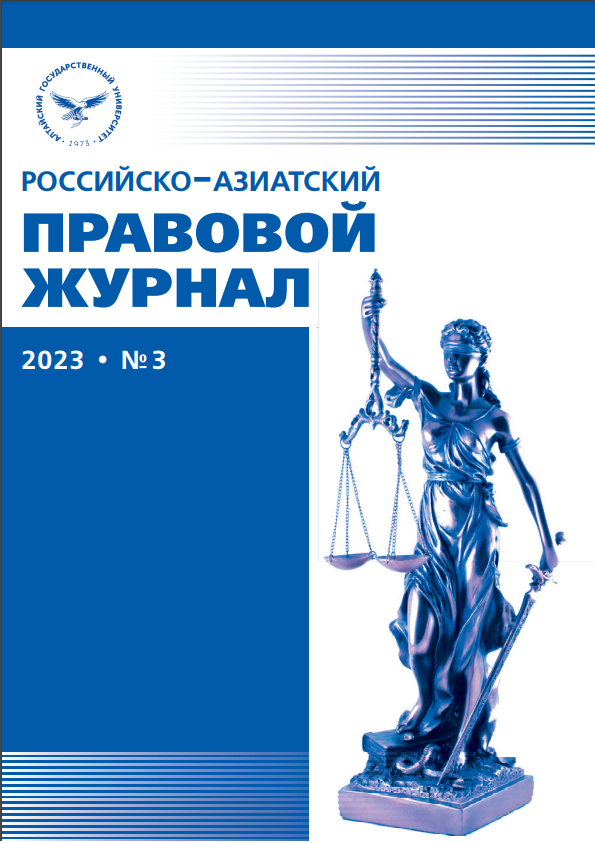КОНЦЕПТУАЛЬНЫЕ ПОДХОДЫ К РАЗВИТИЮ ЮРИДИЧЕСКОГО ОБРАЗОВАНИЯ В РЕСПУБЛИКЕ БЕЛАРУСЬ
УДК 34 ББК 67
Abstract
xThe present stage of development of legal education in the Republic of Belarus is described. Thelegislation of the Republic of Belarus regulating the relations in the sphere of training of legal profilespecialists is analyzed. Special attention is paid to the conceptual directions of development of legaleducation. Attention is paid to the influence of certain factors on the opportunity of realization of thedirections, stated by the Concept of development of juridical education. The essence and basic directionsof realization of the Conception of development of juridical education in the Republic of Belarus till 2025are disclosed. The experience of the Russian Federation and the Republic of Kazakhstan in elaboration ofconceptual directions of higher education development is given in the article. The conclusion about necessityof orientation of modern juridical education not only on the approaches shaped in world practice in training, but also on the most positive and effective approaches of various systems of preparation of experts of a legalprofile that will allow providing more flexible possibility of adaptation to changing conditions.
Downloads
References
Калинин С.А. Проблемы реформирования юридического образования: попытка системного анализа // Юриспруденция XXI века: горизонты развития: Очерки / под ред. Р. А. Ромашова, Н.С. Нижник. СПб. : Санкт-Петербургский университет МВД России, 2006. С. 193–212.
Кодекс Республики Беларусь об образовании: принят Палатой представителей 2 дек. 2010 г.: одобр. Советом Респ. 22 дек. 2010 г., в ред. от 14 янв. 2022, №154-З // Эталонный банк данных правовой информации Респ. Беларусь / Нац. центр правовой информ. Респ. Беларусь. Минск, 2023.
Об утверждении Государственной программы развития высшего образования на 2011– 2015 годы : постановление Совета Министров Респ. Беларусь от 1 июля 2011 г. №893 // Эталонный банк данных правовой информации Респ. Беларусь / Нац. центр правовой информ. Респ. Беларусь.Минск, 2023.
О Концепции развития системы образования Республики Беларусь до 2030 года : постановление Совета Министров Респ. Беларусь от 30 нояб. 2021 г. №683 // Эталонный банк данных правовой информации Респ. Беларусь / Нац. центр правовой информ. Респ. Беларусь. Минск, 2023.
Концепция развития юридического образования в Республике Беларусь на период до 2025 года : утв. Министром образования Респ. Беларусь 31 авг. 2017 г. // Эталонный банк данных правовой информации Респ. Беларусь / Нац. центр правовой информ. Респ. Беларусь. Минск, 2023.
Сосновский А.А. Перспективы развития юридического образования в Беларуси. 2021. URL: http://www.vitebskjust.gov.by/info/news/783/ (дата обращения: 31.05.2023).
Каменков В.С. От концепции до конкретного юриста и человека // Журнал Белорусского государственного университета. Право. 2018. №2. С. 12–18.
В МГЮА обсудили Концепцию развития высшего образования в России // Московский государственный юридический университет им. О.Е. Кутафина. URL: https://msal.ru/news/v mgyua-obsudilikontseptsiyu-razvitiya-vysshego-obrazovaniya-v-rossii/ (Дата обращения: 31.05.2023).
Голиченков А.К. Концепция развития юридического образования в современной России: возможный подход к ее формированию / А.К. Голиченков, А.А. Бережнов // Вестник Московского университета. Серия 11. Право. 2022. №5. С. 3–15.
Об утверждении Концепции развития высшего образования и науки в Республике Казахстан на 2023–2029 годы : постановление Правительства Респ. Казахстан от 28 марта 2023 г. №248 // Информационно-правовая система нормативных правовых актов Республики Казахстан. URL: https://adilet.zan.kz/rus/docs/P2300000248 (дата обращения: 31.05.2023).
Вегера И.В. Современные вызовы и перспективы развития высшего юридического образования // Вестник Полоцкого государственного университета. Юридические науки. 2021. №14. С. 103–108.
Russian-Asian Law Journal is a golden publisher, as we allow self-archiving, but most importantly we are fully transparent about your rights.
Authors may present and discuss their findings ahead of publication: at scientific conferences, on preprint servers, in public databases, and in blogs, wikis, tweets, and other informal communication channels.
Russian-Asian Law Journal allows authors to deposit manuscripts (currently under review or those for intended submission) in non-commercial, pre-print servers such as ArXiv.
Authors who publish with this journal agree to the following terms:
- Authors retain copyright and grant the journal right of first publication with the work simultaneously licensed under a Creative Commons Attribution License that allows others to share the work with an acknowledgement of the work's authorship and initial publication in this journal.
- Authors are able to enter into separate, additional contractual arrangements for the non-exclusive distribution of the journal's published version of the work (e.g., post it to an institutional repository or publish it in a book), with an acknowledgement of its initial publication in this journal.
- Authors are permitted and encouraged to post their work online (e.g., in institutional repositories or on their website) prior to and during the submission process, as it can lead to productive exchanges, as well as earlier and greater citation of published work (See The Effect of Open Access).








